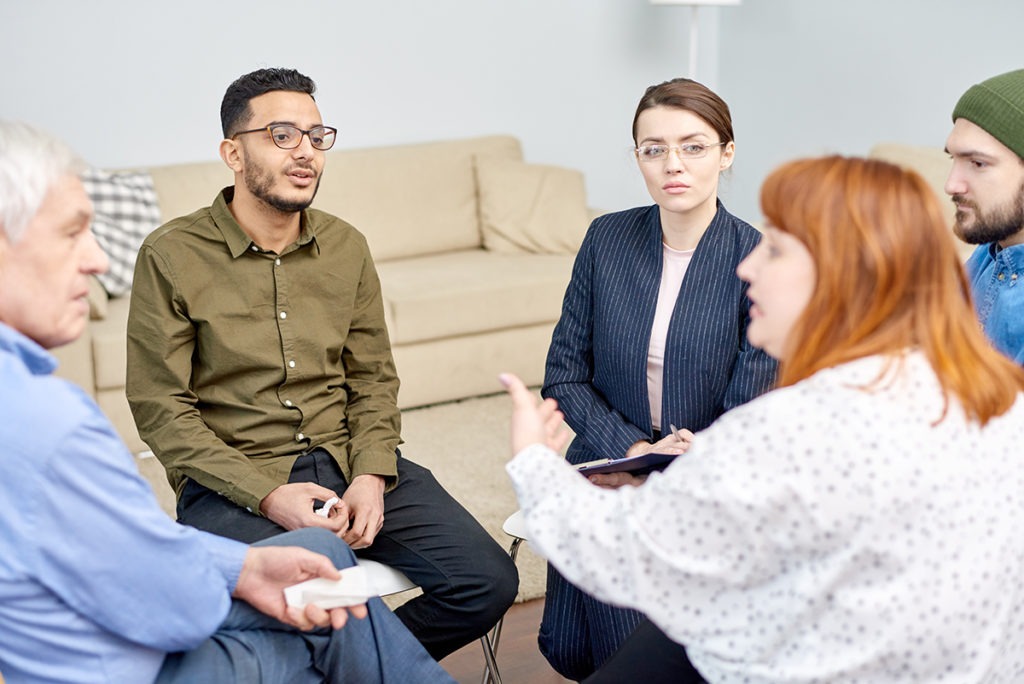When someone struggles with drugs or alcohol, their life can change in ways they might not expect. Millions of people worldwide face these challenges each year, but recovery is possible—and you don’t have to face it alone. The Right Step offers comprehensive drug and alcohol addiction treatment programs to help individuals overcome their dependency and lead healthy, fulfilling lives.
Addiction is a disease, and it often happens in stages. Knowing what those stages look like helps families and loved ones recognize when it’s time to seek help. If that time comes, don’t hesitate to get in touch with our team. We’ll work with you every step of the way to create a personalized treatment plan that addresses your individual needs.
Understanding the stages of addiction
The journey through addiction follows three main stages. These are sometimes called the stages of substance use disorder or the stages of drug addiction. Understanding these stages can help people know when to reach out for support or look for signs that things might be getting worse.
Stage 1: Binge and intoxication
At first, using drugs or alcohol can feel exciting or relaxing. But when someone starts using regularly, their brain’s reward system is changed by these substances. Every time drugs or alcohol enter the body, the brain releases extra dopamine—the chemical that makes people feel happy or satisfied. This rush is why some start to use more and more, chasing the same feeling.
Certain moments, places, or feelings can act as triggers that make someone want to use substances. For example, being around specific friends or attending parties can serve as reminders. Visiting locations where substances were previously used or experiencing thoughts that connect back to past use can also prompt cravings.
For some, challenges like depression, anxiety, or stress can make them more likely to reach for drugs or alcohol during this first stage. The relief is only temporary, though. After a while, things can get much harder.
Stage 2: Withdrawal and negative affect
The second stage can feel less like a choice and more like a necessity. People are no longer using drugs or alcohol to feel good; now, they use them to avoid feeling awful. The body has become dependent.
During this stage, the person may want to stop using, but the symptoms and cravings are overwhelming. They might cycle through periods of trying to quit, only to use again to relieve the discomfort. This can be a scary place for the person struggling and their loved ones.
Stage 3: Preoccupation and anticipation
Substance use is no longer about having a good time at this stage. The brain has been changed so much that the urge to use drugs or alcohol takes over thoughts, plans, and daily life. Even with serious consequences, it can feel almost impossible to stop.
The good news is that even at this stage, recovery is possible. Addiction treatment programs are designed to support people at every phase of this cycle.
What to expect from the stages of addiction treatment
While people move through the stages of substance abuse in their own ways, there are also stages of addiction treatment designed to help with each challenge. Addiction treatment programs are customized to fit the needs of everyone, but some common steps include:
- Detox: In this first step, the goal is to remove harmful substances from the body. Medical professionals can help manage withdrawal and make the process safer and more comfortable.
- Therapy and counseling: This includes one-on-one sessions where people talk through the reasons behind their substance use, as well as group therapy that provides support and connection with others facing similar challenges.
- Dual diagnosis care: Many people who have substance use disorders also struggle with mental health conditions like depression or anxiety. Treating both at the same time can improve long-term success.
- Relapse prevention: Learning skills to handle stress, triggers, and complicated emotions is key to building a strong foundation for sobriety.
- Family support: Involving loved ones can heal relationships and build a support network for lasting recovery.
- Aftercare: Recovery doesn’t stop when treatment ends. Continued counseling, support groups, and healthy lifestyle changes help keep people on track.
Exploring the stages of chemical dependency and drug dependence
Many experts talk about the stages of chemical dependency or drug dependence. These stages can mirror the progression of addiction, but they focus more on the body’s changes and physical reliance on substances. From the first time someone uses drugs or alcohol, their body and mind begin a journey that may lead through tolerance, dependence, and eventually the powerful need to keep using to feel normal. Early awareness of these stages can spark action and start the journey to recovery.
The stages of the addiction cycle: How patterns form
Understanding the stages of the addiction cycle can help people recognize patterns and risk factors in their own lives or the lives of those they care about. This cycle may begin with experimentation, move through regular use, and then develop into substance abuse and dependency. By noticing early warning signs and reaching out for help, it’s possible to break the cycle before it becomes harder to overcome.
Stages of substance use: recognizing early signs
Some people ask about the stages of substance use, not just addiction. These stages can include:
- Experimentation: Trying a drug or alcohol for the first time. This stage doesn’t always lead to regular use but is a risk factor.
- Regular use: Using substances regularly, sometimes to socialize, relax, or escape from problems.
- Risky use: When the behavior starts to cause problems like trouble at work, school, or home.
- Dependence: When someone feels sick or uncomfortable without drugs or alcohol.
- Addiction: When the urge to use becomes the most critical thing in daily life.
The earlier someone notices the warning signs, the sooner they can seek family support or professional help.
Frequently asked questions (FAQs) about the stages of addiction
What are the three stages of addiction, and how do they progress?
The three main stages are binge and intoxication, withdrawal and negative affect, and preoccupation and anticipation. Each stage brings new challenges. In the first stage, people seek pleasure and reward from drugs or alcohol. In the second stage, they use substances to avoid withdrawal symptoms, often feeling trapped. The third stage is when substance use takes over daily life and thoughts, making it hard to function without the substance.
How can understanding the stages of addiction help in choosing the right treatment?
Recognizing the stages can guide people and their support systems toward the most helpful addiction treatment programs. For example, someone in the withdrawal and negative affect stage might need medical detox. Someone in the preoccupation stage may benefit from intensive therapy and ongoing aftercare. Meeting people where they are helps set them up for success and a real chance at long-term recovery.
What are the key differences between the stages of substance use disorder and chemical dependency?
The stages of substance use disorder focus on how behavior and feelings change over time, while the stages of chemical dependency look more at the physical changes happening in the body. Both are essential parts of understanding addiction and making care decisions.
How do the stages of drug addiction impact the recovery process?
Each stage may need different types of support. For example, someone in the first stage may respond well to education and counseling. In contrast, someone further along may need a stronger focus on breaking the cycle of dependence and relearning healthy coping strategies.
What role does the addiction cycle play in the stages of substance abuse?
The addiction cycle explains how substance use can become a repeating pattern of feeling triggered, using drugs or alcohol, suffering withdrawal, and feeling cravings again. Understanding and interrupting this cycle is a big part of recovery and is a focus for many addiction support groups and treatment teams.
Connect with The Right Step and discover how recovery is possible at any stage
Everyone’s journey through addiction is different—and so is the path to hope and recovery. Whether you or someone you care about is facing the early warning signs or feeling stuck in the most challenging stages, know that healing and a better tomorrow are within reach. Compassionate care, expert guidance, and true understanding can help you find your way forward.
Call 888.488.6017 today or contact our team online for support and more information about addiction treatment programs. You are not alone on this journey—together, we can find brighter days ahead.






